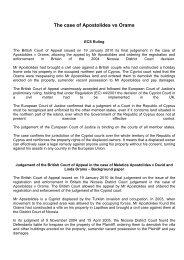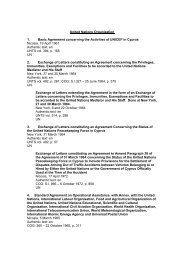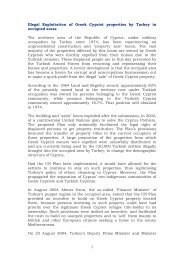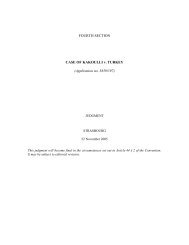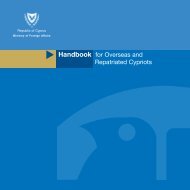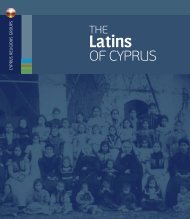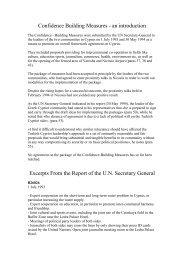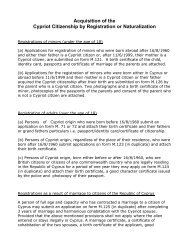Myra Xenides- Arestis v. Turkey
Myra Xenides- Arestis v. Turkey
Myra Xenides- Arestis v. Turkey
Create successful ePaper yourself
Turn your PDF publications into a flip-book with our unique Google optimized e-Paper software.
XENIDES-ARESTIS v. TURKEY DECISION 29upon a principle of discrimination in terms of national or ethnic origin, iscompatible with general international law.According to the applicant, the recognition of the “TRNC” as a statewould involve the recognition of a secession from, and a partition of, theRepublic of Cyprus in breach of the express provisions of the Treaty ofGuarantee as well as a failure to implement the decisions of the SecurityCouncil concerning the situation in Cyprus. She points out that the Turkishinvasion and occupation of northern Cyprus involved and continue toinvolve breaches of the rules of general international law and the provisionsof Article 2 (4) of the UN Charter (use of force), the provisions of whichprevail over the obligations of Member States under any internationalagreement including the Convention (Article 103 UNC). In this context sheobserves that it is necessary to affirm the proper relationship of theprovisions of general international law and the provisions of theConvention. She also refers to the Advisory Opinion of the InternationalCourt of Justice on Namibia (op. cit.) case in which that court gave clearexpression to the duty not to recognise situations involving illegality. TheCourt in its judgment in Cyprus v. <strong>Turkey</strong>, taking into account theaforementioned advisory opinion (§ 125), affirmed the invalidity of thecontemporaneous property legislation in the Turkish occupied area (op. cit.,§§ 180-187). Thus, property legislation based upon policies adopted by thesubordinate local administration set up by <strong>Turkey</strong> has no validity ininternational law. The reason for this stems from the illegality of acts underinternational law that cannot be avoided by the creation of “local remedies”.The Namibia advisory opinion cannot be used to validate acts contrary tothe UN Charter and principles of general international law anddiscriminatory legislation.In the alternative, the applicant maintains that the consistent policy of<strong>Turkey</strong> and its agents in the occupied area has been to exercise control over,and to exclude the owners of, properties and plots of land on adiscriminatory basis. Such a discriminatory policy constitutes an affront tointernational standards of human rights. It is incompatible with theprovisions of the Convention and the principle of general international lawof non-discrimination, which has the quality of jus cogens, whether appliedby administrative means or on the basis of legislative measures.Furthermore, the applicant contends that the determinations of the Court inthe case of Cyprus v. <strong>Turkey</strong> (op. cit.) in relation to the position of displacedpersons and the Greek Cypriots living in the enclaved Karpas area arereadily applicable to the discriminatory policy of <strong>Turkey</strong> toward theproperty of the displaced Greek Cypriots. She notes that in its judgment theCourt recognised the application of illegal measures both to the enclavedGreek Cypriots and the displaced Greek-Cypriot owners.The applicant points out that the tactical purpose of the new law is toprovide an admissibility hurdle for all the refugees and other property cases





